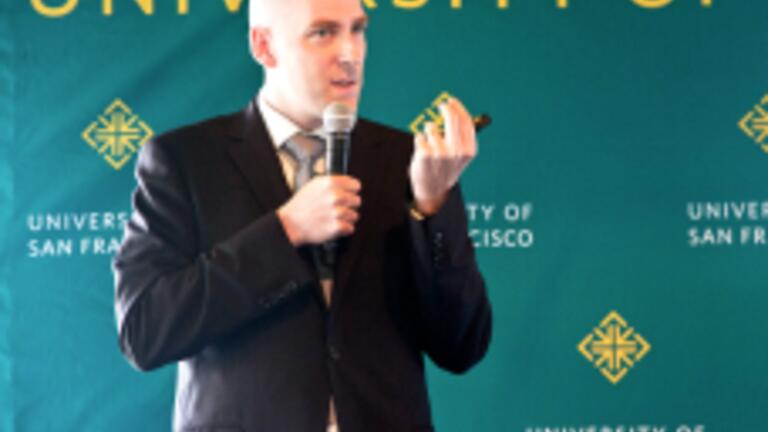
Grad Student Orientation Teaches Ethics and Cross-Cultural Skills

As part of the orientation day the graduate students heard a sample lecture on ethics by Professor Neil Walshe. In line with USF's "There is no 'moral compass' app" advertising and the Jesuit tradition, Dr. Walshe lectured on the complicated nature of concepts like morality, virtue, courage and cowardice, and the difference between a moral process and a moral product in business. "Why are people always saying there is only one morality?" he asked. "Why are we so insistent that there is only one? Isn't that just like saying there is only one truth?" Dr. Walshe encouraged the new graduate students to continually challenge their moral compasses. "Grad school should make you slightly uncomfortable," he said. "If you are not at least a little bit uncomfortable about a moral grey zone in business, you're probably not grappling with these concepts enough." He stressed that graduate school was the time to learn to challenge their own beliefs, so that they might apply them successfully in their future professional lives. "Don't confuse what is right with what is good," he said. "If you do that, you'll soon start believing in this 'one truth' idea. It's complex. In business, the behavior is yours." Dr. Walshe said that in business, we can adopt a company's ethics and strategies, or not, but we must always continue to question our behavior. "The greatest immorality is not questioning these attributions we have, our own ideas of morality and what constitutes it, and grey areas."
"That lecture, this whole day, it's getting my brain back in gear, waking it up," said Dylan Goelz, a starting MBA student. "It's good to get the gears turning again."
The School of Management addressed the topic of cultural differences with the goal of turning a potential problem area for the school's international student body into a unique area of strength for globally oriented programs and for the students' futures as business leaders. Craig Storti, author and public speaker on cultural differences around the world and how they pertain to the work environment, taught a workshop to the new students on these topics. "To succeed in a global business environment, it's important to understand how your beliefs, values and assumptions differ from someone else's," said Mr. Storti. "That way when someone does something you don't understand, you'll know it's because to them, it makes sense. If you don't know about cultural differences, this impedes your ability to work with people of different cultures, and can lead to misunderstandings, frustration and anger."

Even in a crowd as globally oriented as the School of Management graduate students, extreme differences between various cultural assumptions soon became apparent. When rating their cultures' communication styles, for example, it became clear that students from the United States, Canada, New Zealand and France valued communication that was direct and explicit, where people say exactly what they mean, with little nuance, understatement or implied meaning. Students from China, India, Vietnam, Thailand and Saudi Arabia, on the other hand, were more familiar with implicit and indirect communication, where nuances in language suggest meaning and reading between the lines is required, due to cultures of respect and "saving face." When it came to management styles, students from the United States and Northern European countries were familiar with decentralized management, where managers delegate authority and responsibility, empower their subordinates and err on the side of giving minimal guidance and supervision, assuming subordinates will come to them with questions. Students from France, Thailand, Saudi Arabia, Vietnam, India and China, however, were more familiar with centralized, hands-on management where managers give very specific instructions and employees often do not approach management with questions for fear of insulting their superiors' explaining techniques, consulting their peers instead.
These cultural assumptions can potentially cause big problems in student-to-peer communication and student-to-professor relationships, as well as in future employee-to-employer communication and relationships. "These are very complex topics," said Mr. Storti after the workshop, "and extremely important for business students to be aware of. I hope that learning about it this early on will have some impact on how they interact with the international students in their midst and will help them make the most of the graduate programs. The more research they do on these topics, the more this will help them in their professional lives, and hopefully by starting today we have made a difference in how difficult or easy this will be for them in the future."
"The various lectures we heard really made me think," said Nam Nguyen, a first-year MSFA student. "I'm going to try to apply all the advice we heard to my studies."

"I heard so much useful information and advice today," said Isaac Rivera, a starting MSIS student. "Things like 'go ahead and explore.' 'Don't be afraid that you'll be alone in that, there is a lot of support.' And my favorite was 'build relationships, not networks.' I'm going to try to remember these once the semester starts."
Are you interested in learning more about cultural differences and their relevance to the business environment? We have access to Mr. Storti's sizeable reading list on the topic and can advise you on further research. Please contact sommarcom@usfca.edu for more information.